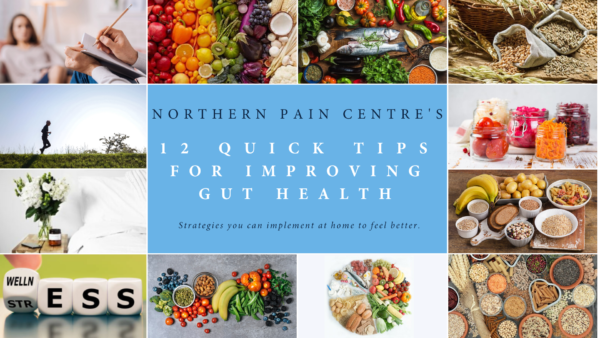12 Quick Tips for Improving Gut Health
Northern Pain Centre is committed to giving patient’s practical steps for managing many of the challenges they face as a result of their pain. Welcome to our 12 Quick Tips Series.

Here are our 12 quick tips for a improving gut health:
- Speak with your doctor: it is important to eliminate any underlying issues, including:
- Coeliac disease (learn more here), which will often require a gluten-free diet
- Non-coeliac gluten sensitivity (learn more here), which will often require a FODMAP diet
- Irritable bowel disease (learn more here), which will often require a FODMAP or high-fibre diet
- Lactose intolerance (learn more here), which will often require a lactose-free or low-lactose diet
- Metabolic or hormonal issues (learn more here)
- Eat the rainbow in fruit and vegetables: not only are they filled with vitamins and nutrients, they also contain high levels of fibre which stimulate the growth of your good bacteria (learn more about the research here)
- Try new foods: eating a wide range of foods, helps to promote a wide range of gut bacteria, which appears to lead to better all-round health (learn more about the research here)
- Increase your fibre: increasing your fibre promotes gut health, the growth of good gut bacteria and prevention of some diet-related diseases (learn more about the research here)
- Introduce fermented foods into your diet: fermented food are prebiotics which support good gut bacteria and gut health (learn more about the research here)
- Increase resistant starch in your diet: this acts like insoluble fibre, moving to the large intestine and promoting the growth of our good gut bacteria (learn more about the research here)
- Eat more whole grains: whole grains are high in fibre and contain many non-digestible carbohydrates which are broken down in the large intestine and promote the growth of different gut bacteria. Eating whole grains can keep you full for longer, reduce the risk of heart disease and inflammation (learn more about the research here)
- Change your plate ratios: increase the levels of vegetables, legumes, seeds, nuts and fruits on your plate. People who eat a higher proportion of plant-based foods, tend to have lower risks of obesity, inflammation and cholesterol (learn more about the research here)
- Increase your intake of foods high in polyphenols: these are a compound found in plants which are often digested in the gut by our gut bacteria. They have many positive health benefits including reducing inflammation, blood pressure, cholesterol and oxidative stress. Some high polyphenol foods include: dark chocolate, grape skins, green tea, almonds, red wine, blueberries, broccoli and onions (learn more about the research here)
- Managing our stress: Stress levels play a large role in the health of our gut and it’s lining, our immune system function, our metabolism, our weight and even our pain. Managing our stress levels helps to alleviate the toll this takes on us, to learn more about stress management techniques visit here.
- Good quality sleep: Sleep plays a role on our gut bacteria, the hormones we produce which manage appetite and hunger. Evidence suggests that the gut microbiome can also influence our quality of sleep and our body clock’s natural rhythm. To learn more about improving your sleep visit here.
- Moving more: Exercise has been shown to change the diversity and functional capacity of our gut bacteria, and our health and wellbeing. Moving more also has positive effects on our mood, pain and sleep. To learn more about moving more visit here.
To learn more about Gut Health and Pain, read our 4-part series:
- Gut Health and Pain – Part 1: Know Your Gut
- Gut Health and Pain – Part 2: The Gut-Brain Connection
- Gut Health and Pain – Part 3: Your Gut and Stress
- Gut Health and Pain – Part 4: Changing your Gut Health
Video’s worth a watch on Gut Health:
- What is the human microbiome?
Video courtesy of The Conversation
- Your gut microbiome: The most important organ you’ve never heard of.
Video courtesy of TEDxTalks
- What is the best diet for humans?
Video courtesy of TEDxTalks
-
How gut microbiome is affected by circadian rhythm and sleep deprivation
Read More Quick Tips
- 12 Quick Tips for Improving Gut Health
- 12 Quick Tips for Introducing Pacing into Your Day
- 12 Quick Tips for Planning Your Day with Chronic Pain
- 12 Quick Tips for Moving More
- 12 Quick Tips for Setting Goals with Chronic Pain
- 12 Quick Tips for a Better Quality Sleep
- 12 Quick Tips for Improving Your Nutrition